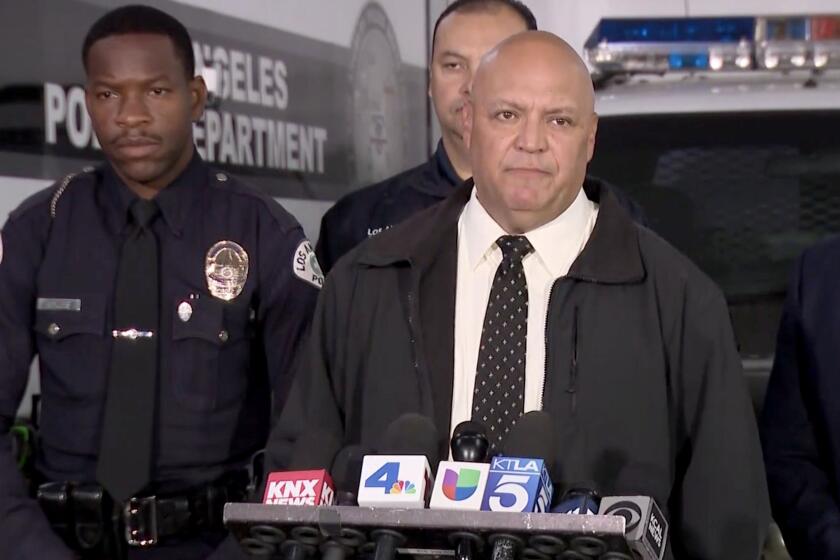Battles brew as gay marriage ban is upheld
The California Supreme Court’s decision Tuesday to uphold Proposition 8 and existing same-sex marriages left in place all rights for California’s gays and lesbians except access to the label “marriage,” but it provided little protection from future ballot measures that could cost gays and other minorities more rights, lawyers and scholars said Tuesday.
In a 6-1 ruling, the court said the November ballot measure that restored a ban on same-sex marriage was a limited constitutional amendment, not a wholesale revision that would have required a two-thirds vote of the Legislature to be placed before voters.
The court was unanimous in deciding that an estimated 18,000 same-sex couples who married before the November election would continue to have their marriages recognized by the state.
Proposition 8 merely “carves out a narrow and limited exception” to the state constitutional protection gays and lesbians now receive, Chief Justice Ronald M. George wrote for the majority.
The court majority said same-sex couples would continue to have the right to choose life partners and enter into “committed, officially recognized and protected family relationships” that enjoy all the benefits of marriage under the state’s domestic partnership law.
“Like opposite-sex couples, same-sex couples enjoy this protection not as a matter of legislative grace, but of constitutional right,” George wrote.
UC Berkeley constitutional law professor Goodwin Liu said the ruling shows “the court continues to be very deferential to the processes of direct democracy in California.”
In a separate, concurring opinion, Associate Justice Kathryn Mickle Werdegar noted some rights married couples have that domestic partners do not, and suggested that the state now has the duty “to eliminate the remaining important differences.”
She agreed with the majority that Proposition 8 was not an illegal constitutional revision, but said the ruling’s definition of revision was too inflexible.
Describing Proposition 8’s “limited effect,” the majority said that simply reserving the term “marriage” for opposite-sex couples “does not have a substantial, or, indeed, even a minimal effect on the governmental plan or framework of California that existed prior to the amendment.”
In deciding that gay couples who married in California before the November election will remain married, the court said it would be unfair and might even invite chaos to nullify marriages those couples entered into lawfully.
Ending those marriages would be akin to “throwing property rights into disarray, destroying the legal interests and expectations of thousands of couples and their families, and potentially undermining the ability of citizens to plan their lives according to the law as it has been determined by the state’s highest court,” George wrote.
Portions of the majority ruling read as a lament over the ease with which the California Constitution can be amended.
The 136-page majority decision contained a lengthy history of the state Constitution and the ballot amendment process and distinguished California’s amendment process from those of other states and the federal Constitution.
“If the process for amending the constitution is to be restricted,” George wrote, “this is an effort that the people themselves may undertake.”
It is neither impossible nor improper to limit how voters may change the Constitution, George wrote.
“We have no doubt that an express restriction could be fashioned that would limit the use of the initiative power in the manner proposed by petitioners -- but the California Constitution presently contains no limits of this nature,” he said.
By stressing that only the term “marriage” was affected by the November election, the court seemed to signal that a broader ballot measure might not be upheld.
But the court’s definition of what would be an impermissible constitutional revision was also narrow and left gay rights activists nervous and several legal scholars skeptical.
“It leaves us to the kindness of strangers,” said Jon W. Davidson, legal director of Lambda Legal, a gay rights organization. “They could take away anything.”
UC Davis law professor Vikram Amar agreed, saying the court defined an illegal revision as a measure that changes the structure of government, not one that takes away individual rights.
“It is hard to see how any repeal of any person’s liberty or property would affect the structure of government” and be deemed an improper revision, Amar said.
Jesse Choper, a professor of constitutional law at UC Berkeley, said the court’s ruling means that voters may take away individual rights “in a limited fashion” and that the scope of the measure will determine whether it is permissible.
“The court wasn’t happy about this. Proposition 8 changed their opinion” last year that gave gays and lesbians marriage rights, he said. “The justices stood up and said, ‘OK, people have the right to do so, and it is not a revision because it is limited in scope.’ ”
Justice Carlos R. Moreno dissented, calling the ruling “not just a defeat for same-sex couples, but for any minority group that seeks the protection of the equal protection clause of the California Constitution.
“The rule the majority crafts today not only allows same-sex couples to be stripped of the right to marry,” Moreno wrote, “it places at risk the state constitutional rights of all disfavored minorities.”
Gay rights advocates and several legal scholars said they were surprised that the court did not attempt to rein in constitutional amendments.
“For the court to see only structural changes as those requiring a greater majority is perhaps the worst feature of the opinion today,” said Pepperdine University law professor Douglas W. Kmiec, who voted for Proposition 8 on religious grounds. “It makes it much too casual for individual rights to be withdrawn.”
Andrew Pugno, a lawyer for the Proposition 8 campaign, said the court simply embraced what had been the law.
“Under this ruling, voters -- no matter what the hypothetical -- the voters can do anything they want with the state Constitution,” Pugno said. If interracial marriage were not protected by the federal Constitution, voters could repeal it, he said.
During oral arguments in March, the court appeared to struggle over how to ensure that minority rights would not be trampled while still upholding Proposition 8.
But instead of curbing the amendment process, the court gave “a blank check to the voters without any limiting principle enunciated,” said Kate Kendell, head of the National Center for Lesbian Rights.
Shannon Price Minter, who helped argue the challenge for Kendell’s group, said he doubted the ruling would have much influence outside California.
“It is such an internally contradictory ruling that I doubt it will be followed anywhere else,” he said.
Ted Olson and David Boies, two prominent lawyers who had been on opposite sides in the Bush vs. Gore case, said they are coming together to challenge Proposition 8 in federal court. Gay rights lawyers have urged supporters to stay out of federal court, fearful of a U.S. Supreme Court ruling that could set the same-sex marriage movement back decades.
In addition to rejecting the gay rights groups’ argument that Proposition 8 was an illegal revision, the court flatly discarded Atty. Gen. Jerry Brown’s contention that the measure should be overturned because it took away an inalienable right.
“No authority supports the attorney general’s claim,” the court said.
--
More to Read
Start your day right
Sign up for Essential California for news, features and recommendations from the L.A. Times and beyond in your inbox six days a week.
You may occasionally receive promotional content from the Los Angeles Times.







